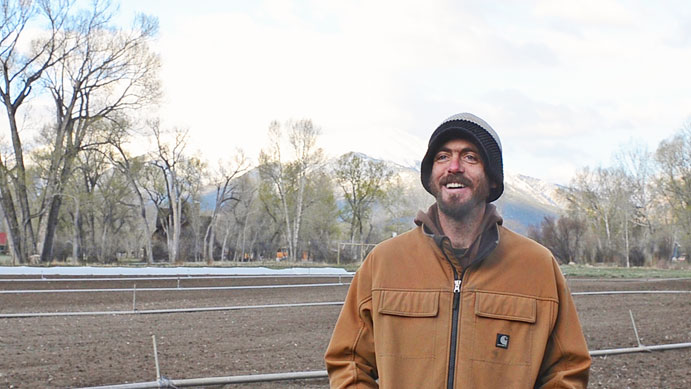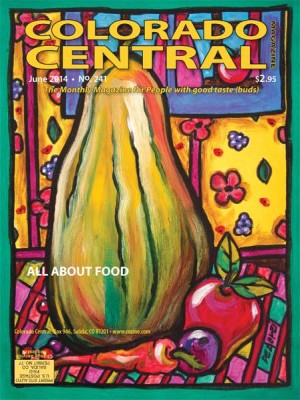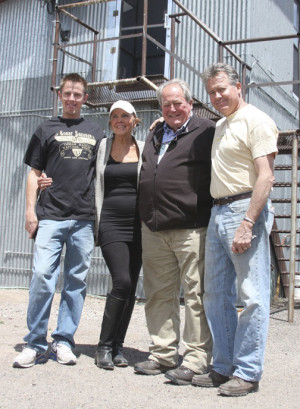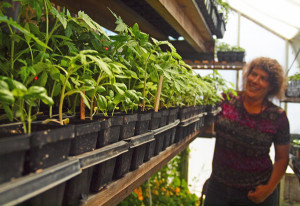by Tyler Grimes
Shifting to a locally grown, plant-based diet is the healthiest choice one can make. Right now in the U.S., 34 percent of adults are obese, as are growing number of children, including 20 percent of 6 to 11-year-olds. Three out of four of the leading causes of death are weight/diet-related illnesses: heart disease, cancer and stroke. According to cancer.org, the best way to reduce the risk of cancer, other than by not smoking, is to “make healthy food choices with a focus on plant-based foods.” Diet is also the best way to prevent stroke, according to the CDC. Unfortunately, the number one source of calories is grain-based desserts, while vegetables aren’t included in the top 25. Fortunately, Central Colorado is on the healthier side of those statistics, though there’s always room for healthier. For that there are plenty of producers who provide locally grown vegetables.
Weathervane Farm
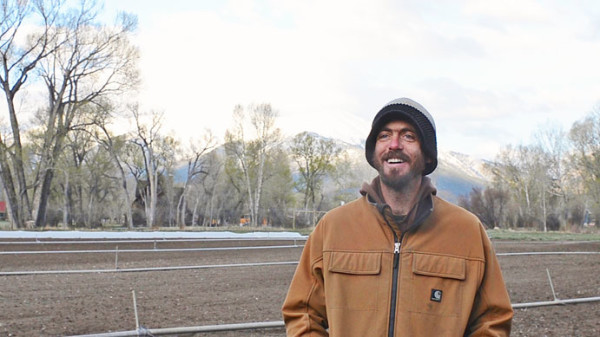
Seth and Caitlin Roberts moved Weathervane Farm, along with years of experience, to Buena Vista from the Fort Collins area in 2008. From the start, the Roberts have been up against an uncertain land situation, first leasing from the previous owner and then from the bank. That changed last fall when the land came under new ownership, which led to a five-year land lease. Since moving to the Arkansas River Valley, Weathervane has grown from an eighth-acre backyard garden to a farm producing on seven acres and year-round in a geothermal greenhouse, with plans to grow to 10 acres by next year.
Weathervane veggies can be found at the Buena Vista, Salida, and Crested Butte farmers markets and at Nature’s Pantry in BV and Simple Foods in Salida. The farm also offers CSA (community supported agriculture) shares – a three-quarter bushel box of vegetables each week for 17 weeks, starting in June. Weathervane also grows flowers, and greenhouse-grown starters for at-home gardeners. Weathervane is not certified organic, but it follows those standards by not using petrochemicals, pesticides or chemicals. It maintains healthy soil by rotating crops, applying manure and compost, and by adding minerals.
Seth spoke about the challenges of farming at 8,000 feet: “That’s one of the reasons I like farming so much; it’s a constant juggling act of an infinite number of variables – weather and tools and people and seeds.” To cope with the short growing season, the Roberts’ start seeds in the climate controlled greenhouse, then move them to a cold-frame hoop house. There the plants begin acclimatization to cooler temperatures and direct sunlight before being transplanted to the fields under row covers. Farming at elevation does have some advantages, like growing lettuce yearround. Another advantage is being near the top of the watershed, as they are fortunate enough to have a senior water right on Cottonwood Creek for irrigation.
Weathervane’s mission is to “cultivate relationships with the land and community.” It makes it a priority to provide high quality farm products while working harmoniously with the environment. Spend any time at Weathervane and you’ll see that it lives up to that mission, allowing kids and pets on the farm, offering work trades and creating an atmosphere conducive to healthy interactions between people and the earth. Seth talked about the importance of local foods: “I like to know where my food comes from and how it’s produced.”
Cho Ku Rei
A local producer in the northern San Luis Valley is Cho Ku Rei Ranch in Moffat. When I first met the owner and operator of Cho Ku Rei, Kyle Grote, he immediately asked if I was a registered voter, because he was collecting signatures to add GMO (genetically modified organisms)labeling to the Colorado ballot. Some countries have banned GMO, or genetically engineered foods completely and others at least require GMO products to be labeled as such. Grote told me GMO foods constitute 85 percent of U.S. food. “I’m so intense about GMOs because I’m worried we’re not going to have any organic food left.” Grote is nearing one full year without GMOs in his diet to help raise awareness about the issue.
Grote bought the 2,400-acre ranch in 2007 for “the opportunity to protect land and water.” It sits on top of 20 artesian wells used to water the fields. Most of Cho Ku Rei’s vegetables are grown in a 6,400- square-foot greenhouse heated by a “virtually smokeless” wood boiler. All electricity for the facilities comes from solar energy. Grote, former video producer in Ohio before moving to the Valley, said his inspiration for food production came from his father, a pizza maker who insisted on using the very best ingredients.
Cho Ku Rei’s main consumer is Grote’s Yak N’ Cracker Cafe and adjacent Cho Ku Rei Farmstore in Crestone. This year Cho Ku Rei will be offering a CSA share. Cho Ku Rei also raises a herd of over 200 yaks, some of which are slaughtered for meat which is sold in the Cafe/Farmstore. However, the primary goal of raising the yaks is conservation. Cho Ku Rei shaves the yaks and sells their coats. Grote offers yak tours in a former army vehicle. As the yaks are partly wild, guests stay in the rear of the vehicle during the tour.
Two of the partners at Cho Ku Rei, Nicole and Darren Smith, help with the greenhouse and raising chickens. Nicole breeds the chickens to get a variety of eggs of various colors, and even eggs with higher immunity. Right now, Nicole has baby turkeys being raised by a mother chicken. She says a turkey with a mother is much healthier.
“Cho Ku Rei is the first basic symbol in Reiki, used to clear negativity and add protection. It also means ‘Direct Spirit,’ and that guides our practice of promoting environmental awareness and stewardship in keeping with the spirit of this place,” said Grote. Before I left the ranch, He reminded me of the GMO petition – Right to Know Colorado, and said if the petition gets the necessary 80,000 signatures, it will be up for a vote on the November 2014 ballot.

